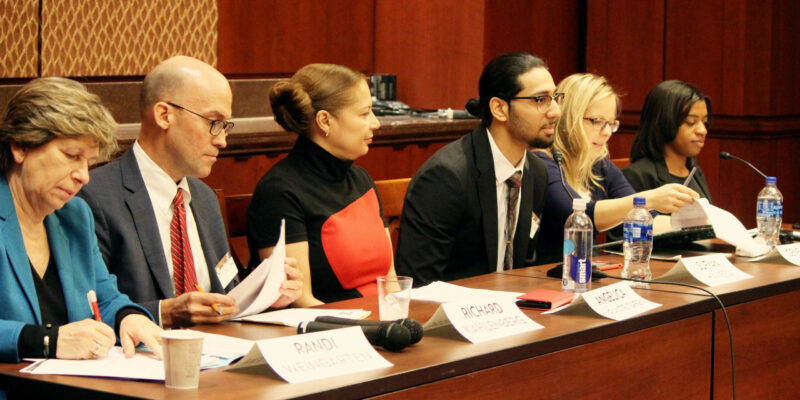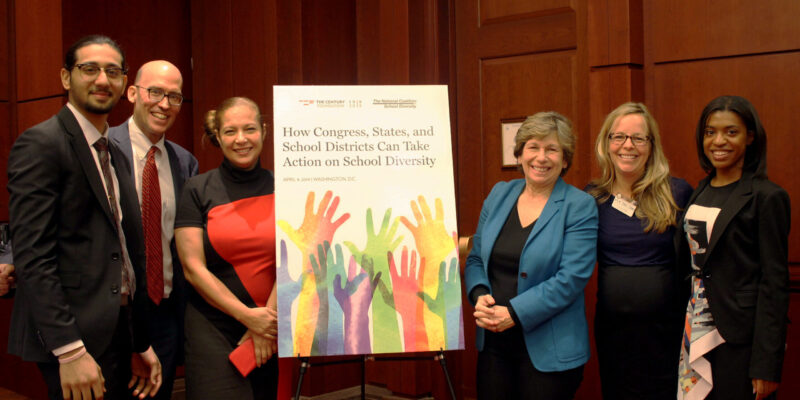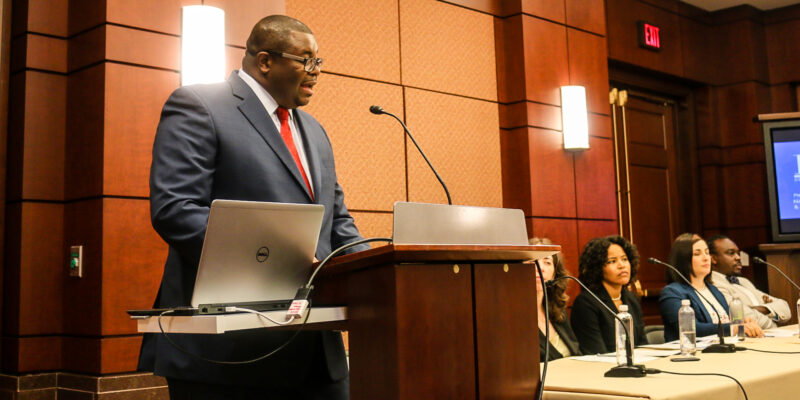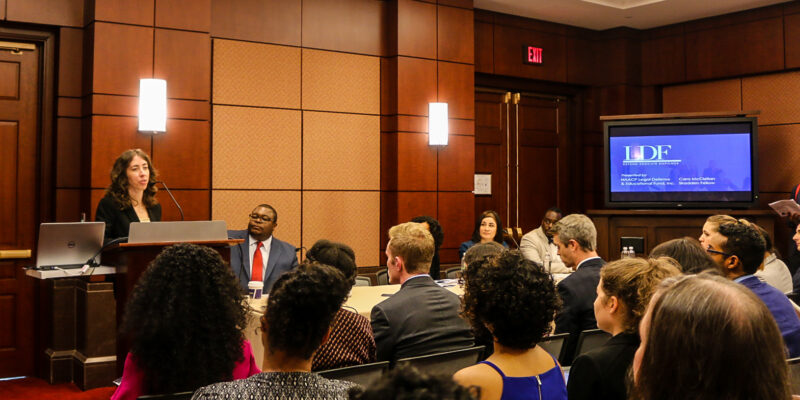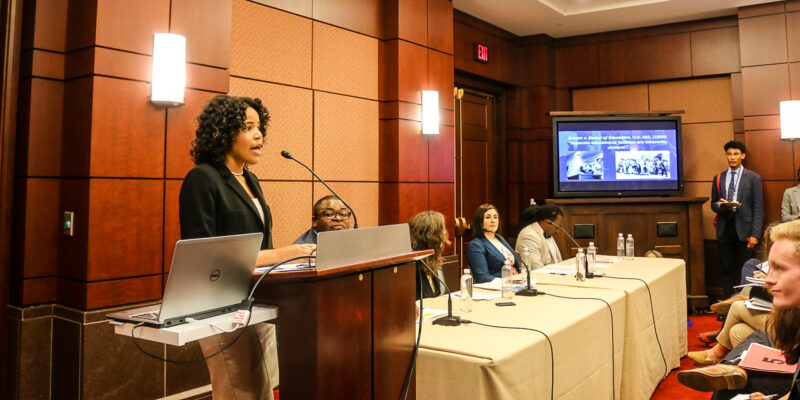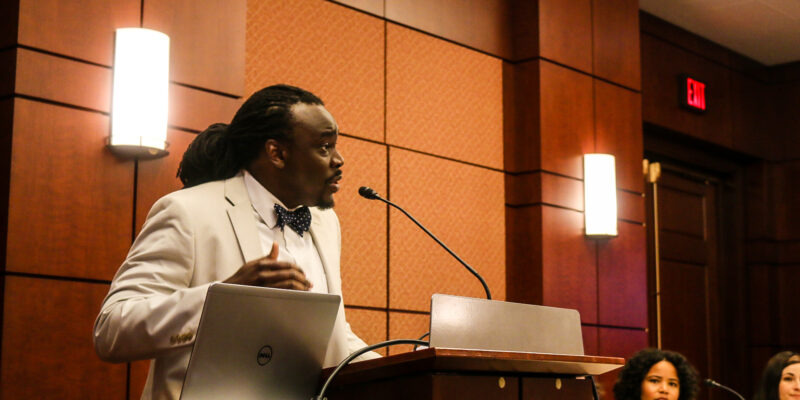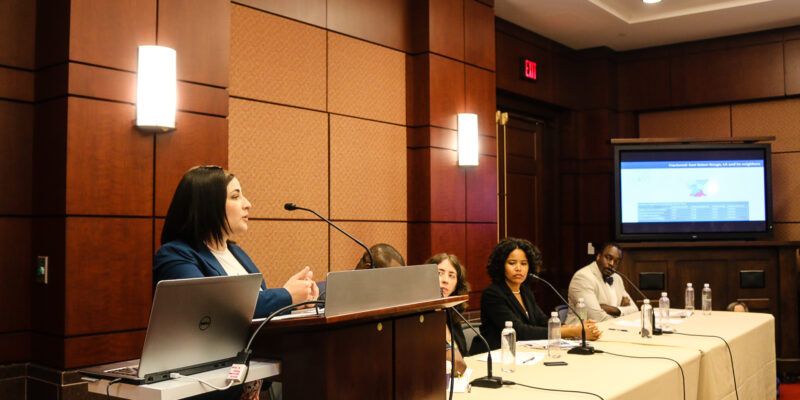How Congress, States, and School Districts Can Take Action on School Diversity
April 9, 2019
10:30am – 12:00pm
The U.S. Capitol Visitor’s Center, SVC Room 201-00
Washington, DC, 20515
Please RSVP to bit.ly/SchoolDiversity
Sixty-five years after Brown v. Board of Education, the research remains clear that integrated schools produce better outcomes for all students, and strategies to promote racial and socioeconomic diversity are being used by school districts across the country.
Please join the National Coalition on School Diversity and The Century Foundation for a congressional briefing on how all levels of government can support the growing national movement for school integration.
Confirmed speakers:
- Randi Weingarten, President, American Federation of Teachers
- Sufyan Hameed, Director of Expansion, IntegrateNYC
- Angélica Infante-Green, Deputy Commissioner, New York State Education Department
- Richard Kahlenberg, Director of K-12 Equity and Senior Fellow, The Century Foundation
- Genevieve Siegel-Hawley, Associate Professor of Educational Leadership, Virginia Commonwealth University
Moderated by Kimberly Quick, Senior Policy Associate, The Century Foundation
This congressional briefing is being held in collaboration with Rep. Robert C. “Bobby” Scott (D-VA-3), Chairman of the House Committee on Education and Labor, Senator Chris Murphy (D-CT), and Representative Marcia L. Fudge (D-OH-11).
See PDF version of invite here.
Share on Twitter here.

In “A School Integration Policy Agenda for 2019 and Beyond,” we outline 10 policy proposals that incentivize integration as the 116th Congress begins its work.
This document builds off of another document, “Crafting a Policy Agenda for 2019 and Beyond,” released in July 2018, which offered a list of strategies for consideration during federal, state, and local deliberations about how to shape our future educational systems.
These ideas are the result of a months-long process of engaging some of the integration movement’s most visionary and pragmatic leaders and thinkers, many of whom are grappling with these issues on a day-to-day basis in schools and community-based settings.
Sunil Mansukhani and James Colligan from The Raben Group facilitated this process. We are extremely grateful to our policy working group members for their time and effort:
- Derek Black, University of South Carolina School of Law*
- Nicole Dooley, NAACP Legal Defense and Educational Fund
- Matt Gonzales, NY Appleseed
- Kris Nordstrom, North Carolina Justice Center
- Will Stancil, Institute on Metropolitan Opportunity at University of Minnesota Law School
*University affiliations provided for informational purposes only
Affirmative Action Is Under Attack
by Michelle Chen
August 31, 2018
The Nation
NCSD’s press release in response to 2018 removal of K-12 school integration guidance by Education Secretary Betsy DeVos and Attorney General Jeff Sessions is cited in this article:
“That affirmative action does not work as it should was actually an issue directly tackled in the Obama-era policy guidance that the Trump administration reversed. It was based on a 2007 landmark ruling in Parents Involved in Community Schools v. Seattle School District No. 1, which allowed for some limited uses of race as a factor in K-12 student placements.”
NCSD member Dennis Parker is also quoted:
“Dennis Park [sic], head of the ACLU’s Racial Justice Project, described the move as an attempt to ‘reverse the progress achieved over the more than half century since Brown v. [Board] of Education.” But he added that the law would ultimately ‘be determined by the Supreme Court and not an Administration which seems bent on promoting division.'”
Over the past year, NCSD been engaged in its first-ever strategic planning process to help us focus on how to uphold policies we helped advance during the last administration and to build on the momentum of the expanding school diversity field, particularly in light of the passage and initial implementation of ESSA and, later, an abrupt change in leadership and direction at the federal level.
The goal of this process was to engage and hear from members, advocates, and allies so that NCSD can formulate a clear strategic roadmap for the next three years. As such, the strategic planning process was developed to be comprehensive and heavily centered on engaging members.
The resulting strategic plan, which can be found here, focuses on the following six goals:
- Serve as the central convener of the school integration field.
- Connect constituents through learning exchanges, information sharing, and peer networks.
- Elevate a critical research agenda that is directly linked to work on the ground.
- Develop a comprehensive and strategic communications agenda.
- Monitor, influence, and protect federal policy.
- Implement a regional outreach strategy to highlight and support grassroots efforts.
We have also updated our mission and vision as follows:
VISION: America’s public education system is the centerpiece of a diverse, interconnected, and just democracy that is free from individual, institutional, and structural racism. The education system is inclusive of the individual and collective histories, perspectives, and voices of the communities it serves. This system values, supports, and equips all young people with the resources and skills they need to thrive. Our policies and social structures reflect a deep, unwavering commitment to our young people, our communities, and our democracy.
MISSION: Here at NCSD, we challenge common assumptions that segregation in our nation’s communities and schools is natural, harmless, or inevitable. NCSD supports brave, bold, visionary changemakers and bridgebuilders as they tackle the root causes of educational inequity and injustice. Our members work to design, enact, implement, and uplift K-12 public school integration policies and practices so we may build cross-race/cross-class relationships, share power and resources, and co-create new realities.
We are deeply grateful to the Ford Foundation for providing support for this process; and to our consultant (Melissa Hewitt, Forward Movement Consulting) and strategic planning committee for all of their hard work on this plan.
School Integration in 2018: Past Achievements, Present Threats, and Future Opportunities
Thursday, July 26, 2018
1:30PM – 2:45PM
House Visitor Center, Room 200
First St NE, Washington, DC 20515
Please join us for a briefing about the importance of school integration, including the real and hard fought benefits it has brought to our society as well as the multiple threats facing it. Our expert panelists will provide their insights on innovative solutions to remedy rising resegregation.
Register here. Read about the event here, we also shared this document with attendees.
If you have any additional questions, please contact James Colligan at jcolligan@rabengroup.com or 202-930-6813.
Beverages and snacks will be provided.

Panelists:
James Ford
Independent Consultant, Filling the Gap Educational Consultants, LLC
@JEFordNCTOY
Erica Frankenberg
Associate Professor of Education & Demography, Pennsylvania State University
Director, PSU Center for Education and Civil Rights
@e_frankenberg
Cara McClellan
Skadden Fellow at the NAACP Legal Defense and Educational Fund, Inc.
@CaraMcClellan6
Zahava Stadler
Director of Policy and Research, EdBuild
@ZahavaEdBuild
Conversation Moderated By:
Damon Hewitt
Executive Director, Executives’ Alliance for Boys and Men of Color
Senior Advisor for U.S. Programs, Open Society Foundations
@DamonTHewitt
About the Speakers:
James E. Ford (BS in Mass Communication, Illinois State University; MA in Teaching Rockford University) is an activist, writer, minister, husband, and father who considers his work an extension of his greater life-calling. He is an award-winning educator and consultant on issues of equity in education. He is the Principal at Filling the Gap Educational Consultants, LLC and is currently pursuing his PhD at UNC-Charlotte in Urban Education. Most recently, he was the Program Director at the Public School Forum of North Carolina, an education think-tank and advocacy organization. Prior to this, he served as the 2014-15 North Carolina Teacher of the Year and the representative for 95,000 public school teachers throughout the state. While in this position, he lobbied the state legislature to help secure the first post-recession raises for teachers and was made chair of the Governor’s Teacher Advisory Committee. Ford taught World History at Garinger High School in Charlotte, NC starting in 2010. Ford’s early career cemented his connection to children and youth. He worked as a truancy intervention specialist in high schools and director of a teen center that provided educational and after-school activities for youth at risk of dropping out of school. In 2014, Ford was recognized as Charlotte Magazine’s Charlottean of the Year and the National Alliance of Black School Educators’ Teacher of the Year. He is a Carnegie Fellow. A self-professed “equity warrior” who believes education is a human right, Ford writes and speaks extensively on the topics of race, class, and education equity and advocates for the most disadvantaged student populations. He is a civic leader in Charlotte, serving as the co-chair for the Leading on Opportunity Council, an effort change the systemic barriers to economic mobility in the city.
Erica Frankenberg (Ed.D., Harvard University) is an associate professor of education and demography in the College of Education at the Pennsylvania State University. Her research focuses on racial desegregation and inequality in K–12 schools with an emphasis on segregation in suburban areas, school choice and racial stratification, politics of school diversity, and the connections between school segregation and other metropolitan policies. She has published more than 50 peer-reviewed articles in leading education policy journals, law reviews, and housing journals as well as writing for policy and practitioner publications. In 2014, she coordinated the Civil Rights and Education conference at Penn State, and is co-editor of a 2016 book from this conference and has edited four other books. In addition to her scholarly work, she has helped school districts design diversity policies, and has served as an expert witness in school diversity cases. Prior to becoming a professor, she led the initiative on school integration at the Civil Rights Project/Proyecto Derechos Civiles. She is a graduate of desegregated schools in Mobile, Alabama.
Prior to joining LDF as a Skadden Fellow, Cara McClellan was a law clerk to the Honorable Gregory M. Sleet of the United States District Court for the District of Delaware and to the Honorable Andre M. Davis of the United States Court of Appeals for the Fourth Circuit. Cara graduated with honors from Yale College, received an M.S.Ed. from Penn Graduate School of Education and a J.D. from Yale Law School. During law school, Cara participated in clinics where she represented youth in neglect and abuse proceedings and in expulsion proceedings and served as a Comments Editor of the Yale Law & Policy Review. She spent her law school summers as an intern at LDF and an intern at the United States Department of Justice’s Civil Rights Division—Educational Opportunities Section. Cara previously taught middle school with Teach for America in Philadelphia. She has published in the Columbia Journal of Race & Law, Yale Law & Policy Review Inter Alia, and the Huffington Post.
Zahava Stadler leads policy research and analysis at EdBuild. Before joining EdBuild, she worked with the School District of Philadelphia on its strategic planning process and completed an Education Pioneers fellowship at TNTP. She began her career in education at Innovative Schools, a nonprofit organization in Wilmington, Delaware, working with school districts and charter schools on human capital issues. Zahava holds master’s degrees in public administration and education policy from the University of Pennsylvania and a bachelor’s degree in politics from Princeton University.
About the Moderator:
Damon Hewitt guides a philanthropic network of over 40 national, local, and community foundation presidents who are committed to systemic change and creating a shared strategy for supporting the liberation work of boys and men of color. Through his leadership, the EA has made philanthropy’s investments in boys and men of color more strategic and impactful. Damon also serves as Senior Advisor for U.S. Programs at the Open Society Foundations, providing strategic guidance on their efforts to advance racial justice, including reforming school discipline policies and improving life outcomes for boys and men of color. Previously, Damon worked for over a decade as an attorney at the NAACP Legal Defense Fund (LDF). There he founded LDF’s Dismantling the School-to-Prison Pipeline initiative and worked in his hometown of New Orleans to coordinate post-Hurricane Katrina litigation and advocacy on education, housing, and voting-rights issues. Damon also worked as Executive Director of the New York Police-on-Police Shootings Task Force. Damon is coauthor of The School‐to‐Prison Pipeline: Structuring Legal Reform (2012, NYU Press), and he has published numerous articles on racial justice, school discipline policy and progressive education reform. He holds a B.A. in political science from Louisiana State University and a J.D. from the University of Pennsylvania Law School.
FOR IMMEDIATE RELEASE 07/03/18
Washington, DC – Today, in another unprovoked attack on local voluntary school integration efforts, Secretary Betsy DeVos and Attorney General Jeff Sessions withdrew an important tool meant to help districts better understand what they can and cannot do in their efforts to promote racial diversity in elementary and secondary public schools.
The withdrawn document, titled “Guidance on the Voluntary Use of Race to Achieve Diversity and Avoid Racial Isolation in Elementary and Secondary Schools,” was originally issued in 2011 by Secretary Arne Duncan and Attorney General Eric Holder, Jr. to help educators make sense of and comply with the legal framework set out by the Supreme Court in the 2007 school integration case, Parents Involved in Community Schools v. Seattle School District No. 1 (“PICS”).
In PICS, the Court placed some limits on the individual use of race in K-12 student assignment. But, the decision also recognized school diversity to be a compelling government interest. In his opinion, Justice Anthony Kennedy outlined ways that local districts might achieve diversity that did not involve selecting individual students on the basis of their race.
The ED/DOJ guidance is being revoked at a time when states and local governments are beginning to exercise some of the flexibility afforded to them by the Every Student Succeeds Act, and many districts have recognized the academic and social benefits of racial and economic diversity for their students.
NCSD urges national leadership to support courageous and visionary educators and policymakers willing to tackle systemic issues, rather than putting more barriers in their way.
Quotes from NCSD Members:
“This is an extraordinarily cynical move by Secretary DeVos. She knows that taking down the guidance doesn’t change the law in any way, but it is likely to confuse school districts that are trying to comply with the law.”
–Gina Chirichigno
Director, National Coalition on School Diversity
“Today’s decision to rescind the thoughtful 2001 guidelines explaining accepted law designed to strengthen education for all students through diverse educational institutions signals an apparent attempt to reverse the progress achieved over the more than half century since Brown v. Bd. of Education was decided. Fortunately, that law is determined by the Supreme Court and not an administration which seems bent on promoting division and a reversal of progress.”
–Dennis Parker
Director, ACLU Racial Justice Project
(Updated 7/3 at 9:10PM)
“Today’s pronouncement is a troubling departure from Supreme Court precedent. Although not surprisingly, this Administration is continuing down the path of racial recidivism that it has signaled in every way it can. Those who have fought for equal opportunity will not give up that fight.”
–Ted Shaw
Julius L. Chambers Distinguished Professor of Law, UNC Law School
Director, UNC Center for Civil Rights
“Since five members of the Supreme Court ruled in 2007 that voluntary school integration was an important, even a ‘compelling’ government goal, the evidence has become even stronger that school integration benefits all children–not just in academic achievement and long term outcomes, but in our children’s ability to thrive in a diverse, multicultural society. That is why so many school districts and even some states are working to promote racial and economic diversity in their public schools.”
–Philip Tegeler
Executive Director, Poverty & Race Research Action Council
“This Administration’s blatant hostility to students of color and people of color is palpable. The evidence is clear that diversity benefits ALL students both academically and beyond. One of the Department of Education’s first acts was to eliminate a small grant program to support locally developed diverse and integrated school programs, despite numerous applicants who had already applied for the grant. Now, it has cemented its place in history as one of the most regressive Administrations, more interested in stalling progress than uplifting and celebrating the benefits of America’s rich racial and cultural diversity. America’s greatness is a direct result of its diversity and this Administration’s actions speak more to its own denial of the facts, fear of progress and willingness to undermine the success of future generations of Americans to maintain the power of the few.”
–Tanya Clay House
CEO, ClayHouse Consulting Inc.
Former Deputy Asst. Secretary, P-12, U.S. Department of Education
“I regret this administration’s action to turn back the clock of OCR and DOJ on the racial guidance policy. However, like Thurgood Marshall and Constance Baker Motley, we will continue to pursue the goal of integration and reduction of racial isolation in grade schools and in colleges in the 21st century.”
–John Brittain
Civil Rights Attorney
“Across the South, districts have used the guidance to build bridges among racially and economically diverse communities and universities have become more accessible and inclusive. Rescinding the guidance sends the wrong message to the students and families in these communities that are taking bold action to counter segregated schooling.”
–David Hinojosa
IDRA National Director of Policy
“U.S. schools today are extremely segregated by both race and poverty and they offer the weakest educational opportunities to African American and Latino students threatening the future of those students.. Since there is powerful evidence of both academic and social benefits of integrated education thoughtful educators are and should be thinking about the use of choice programs and other strategies to increase lasting integration. This move is a strong symbolic rejection of those good efforts, meant to intimidate, but without any legal force. Educators and local leaders should dismiss it as another example of a divisive administration and take steps that are fully legal under the Parents Involved Supreme Court decision.”
–Gary Orfield
Research Professor, UCLA Graduate School of Education
Co-Director, The Civil Rights Project at UCLA
Former Secretaries of Education Arne Duncan and John B. King, Jr. Release Statements Condemning Removal of School Integration Guidance
“In my career, I’ve had a very simple test in deciding whether to pursue a policy or program. “Will it help kids?” The guidance on the use of race that we issued with the Department of Justice in 2011 absolutely met that test. Reams of research shows that educating students in diverse environments helps students of all races, both in the classroom and in the years that follow. In withdrawing this guidance, the Trump Administration is taking another step backward for kids. The withdrawal of this guidance will leave school districts and universities seeking to pursue diversity without a roadmap of how this can be done lawfully and effectively. It will create more uncertainty in the field, with the result being that kids will suffer. Our nation’s children deserve better.”
–Arne Duncan
Former Secretary of Education
“I am deeply disappointed in the Trump administration’s rollback of joint guidance by the U.S. Departments of Justice and Education that promotes diversity and integration on campuses and in schools across the nation, as is consistent with the U.S. Constitution and rulings from multiple U.S. Supreme Court cases.
“Diversity matters. More than 60 years later, our nation still has not fulfilled the promise of Brown v. Board of Education. Research shows the benefits of diversity for all students; and innovative practices in schools, on campuses, and in communities to advance diversity can help protect the future prosperity of our nation and the long-term health of our economy. With each passing day, our country grows more diverse, and despite deeply misguided calls for building walls, the simple truth is we cannot build walls high enough to separate one child’s destiny from that of another.
“This administration’s continued and cruel attacks on civil rights and justice represent a horrific attempt to unravel the very fabric of our democracy. With the search underway for Justice Anthony Kennedy’s replacement on the Supreme Court, the need could not be more urgent for advocates to be vigilant and fight relentlessly for equity and justice, especially for our nation’s most underserved students and families.”
–John B. King, Jr.
Former Secretary of Education
CEO of Education Trust
(Statement issued by the Education Trust)
Related Statements:
Congress Still Won’t Pay For Busing to Desegregate Schools
by Rachel Cohen
June 4, 2018
The Nation
NCSD’s efforts to remove anti-busing language from federal appropriations bills are the subject of this article, which also cites several NCSD members and references our research briefs:
“Dozens of civil rights groups signed onto letters sent to the House and Senate last week, calling on legislators to remove Sections 301 and 302 from the next and future rounds of federal appropriations bills.
‘It is alarming that such legislative language would still be present in 2018, at a time when racial re-segregation of our public schools has surged, where a majority of members of the Supreme Court have declared school diversity to be a ‘compelling government interest,’ and where many districts are working voluntarily to promote racial and economic integration for the benefit of their children and communities,’ the letters state.”
…
“‘We must no longer passively accept the status quo of their presence in appropriations bills,’ stated the National Coalition on School Diversity, a network of more than 50 civil rights groups, university-based research centers, and education practitioners. ‘It’s time for a shift that puts the federal government firmly on the side of local communities that desire to use their federal funds to bolster school integration efforts.'”
FOR IMMEDIATE RELEASE
5/31/18
CONTACT
Michael Mouton, Communications & Partnerships Manager
National Coalition on School Diversity
mmouton@prrac.org
Washington, DC – Over 40 organizations that collectively represent millions of educators, advocates, and other education leaders signed on to two letters submitted to Congress today by the National Coalition on School Diversity (NCSD), requesting that lawmakers commit to removing anti-integration provisions in their FY 2019 appropriations bills. The provisions have been included in appropriations legislation since at least 1974.
The letters, addressed to House and Senate appropriators, urged Congress to “not include any provisions in the FY 2019 appropriations bills that prohibit federal funding from being used for transportation to further public school racial integration.”
Co-signers include a diversity of organizations and individuals, including the NAACP Legal Defense and Educational Fund, American Civil Liberties Union, Southern Poverty Law Center, School Superintendents Association (AASA), National Education Association, and American Federation of Teachers.
Signers are concerned that the anti-integration provisions will unnecessarily limit states and local communities from utilizing the full range of school improvement techniques and other opportunities available to them under the Every Student Succeeds Act (ESSA), stripping them of the very flexibility the law was designed to extend. By barring the use of federal funds to transport students for the purposes of racial integration, these anti-integration provisions undercut educators’ ability to explore innovative and potentially significant reforms.
Specifically, the provisions say:
Section 301: “No funds appropriated in this Act may be used for the transportation of students or teachers (or for the purchase of equipment for such transportation) in order to overcome racial imbalance in any school or school system, or for the transportation of students or teachers (or for the purchase of equipment for such transportation) in order to carry out a plan of racial desegregation of any school or school system.”
Section 302: “None of the funds contained in this Act shall be used to require, directly or indirectly, the transportation of any student to a school other than the school which is nearest the student’s home, except for a student requiring special education, to the school offering such special education, in order to comply with Title VI of the Civil Rights Act of 1964. For the purpose of this section an indirect requirement of transportation of students includes the transportation of students to carry out a plan involving the reorganization of the grade structure of schools, the pairing of schools, or the clustering of schools, or any combination of grade restructuring, pairing, or clustering. The prohibition described in this section does not include the establishment of magnet schools.”
Despite the outdated thinking this language represents, the research on the benefits of diversity are clear. Students attending racially and socioeconomically diverse schools have better test scores and higher college attendance rates than peers attending racially segregated schools with high concentrations of poverty. The benefits from attending diverse schools also continue into adulthood, such as through reduced segregation in neighborhoods, colleges, and workplaces, higher levels of social cohesion, and reduced racial prejudice. Social science also demonstrates the democratic value of meaningful, sustained cross-racial contact among youth.
“NCSD, along with the diverse co-signers of our letter, firmly believe that Sections 301 and 302 are from a bygone era,” said Gina Chirichigno, NCSD director. “We must no longer passively accept the status quo of their presence in appropriations bills. It’s time for a shift that puts the federal government firmly on the side of local communities that desire to use their federal funds to bolster school integration efforts.”
For more information, please visit www.school-diversity.org/rider2019, which is dedicated to this subject.
About NCSD:
The National Coalition on School Diversity is network of 50+ civil rights organizations, university-based research centers, practitioners, and state and local coalitions working to support government policies that promote school diversity and reduce racial isolation.
www.school-diversity.org
An Unusual Idea for Fixing School Segregation
Rachel Cohen
May 23, 2018
The Atlantic
This article cites NCSD research briefs, which outline the benefits of integration:
“In a nutshell, he argues, this idea would drive integration in three ways: It would create an incentive for middle class and wealthy parents to enroll their students in socioeconomically integrated schools, it would create countervailing considerations for white parents considering leaving currently integrated school districts, and it would provide an incentive for private schools to enroll more low-income students. Middle-class students would likely benefit more from Scott-Railton’s idea than low-income students, since his proposal doesn’t inherently change the financial barriers to attending college. But millions more would benefit from the increased K–12 integration, which decades of research show improves public schooling.”
|
|
